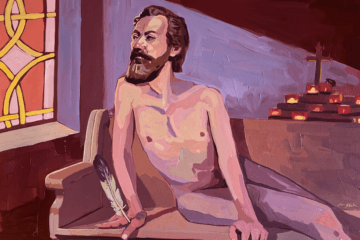Ed Simon at Poetry Magazine:
 In her exquisitely written, perceptive, and moving Super-Infinite: The Transformations of John Donne (FSG, 2022), the British scholar Katherine Rundell argues that Donne’s “writing is itself a kind of alchemy: a mix of unlikely ingredients which spark into gold.” No 17th-century poet still reads quite as shockingly new as Donne does. Not Ben Jonson, who is so clearly of the Renaissance, or sublime George Herbert, enmeshed in the theology of his day. Not Thomas Traherne, whose beautiful mysticism demands a high price of entry, or Andrew Marvell, a chameleon whose politics are now so distant. Even Shakespeare, with all those Ren-Faire jester hats and jigs, is more a subject of that far country of the past than is Donne. An uncertain Catholic and then a recalcitrant Protestant, Donne was a skeptic, an agnostic who knew that in doubt comes faith. His is a “quintessence even from nothingness, / From dull privations, and lean emptiness […] I am re-begot / Of absence, darkness, death: things which are not.” If his age saw the first glimmerings of such anxieties, then Donne reads as modern before modernity because his manuscripts circulated among courtiers and poets. Yet only God can generate from a vacuum, and Rundell explains that Donne’s family and their faith “would haunt him for life. … To read him is to know that we cannot ever expect to shake off our family: only to pick up the skull, the tooth, and walk on.”
In her exquisitely written, perceptive, and moving Super-Infinite: The Transformations of John Donne (FSG, 2022), the British scholar Katherine Rundell argues that Donne’s “writing is itself a kind of alchemy: a mix of unlikely ingredients which spark into gold.” No 17th-century poet still reads quite as shockingly new as Donne does. Not Ben Jonson, who is so clearly of the Renaissance, or sublime George Herbert, enmeshed in the theology of his day. Not Thomas Traherne, whose beautiful mysticism demands a high price of entry, or Andrew Marvell, a chameleon whose politics are now so distant. Even Shakespeare, with all those Ren-Faire jester hats and jigs, is more a subject of that far country of the past than is Donne. An uncertain Catholic and then a recalcitrant Protestant, Donne was a skeptic, an agnostic who knew that in doubt comes faith. His is a “quintessence even from nothingness, / From dull privations, and lean emptiness […] I am re-begot / Of absence, darkness, death: things which are not.” If his age saw the first glimmerings of such anxieties, then Donne reads as modern before modernity because his manuscripts circulated among courtiers and poets. Yet only God can generate from a vacuum, and Rundell explains that Donne’s family and their faith “would haunt him for life. … To read him is to know that we cannot ever expect to shake off our family: only to pick up the skull, the tooth, and walk on.”
more here.
